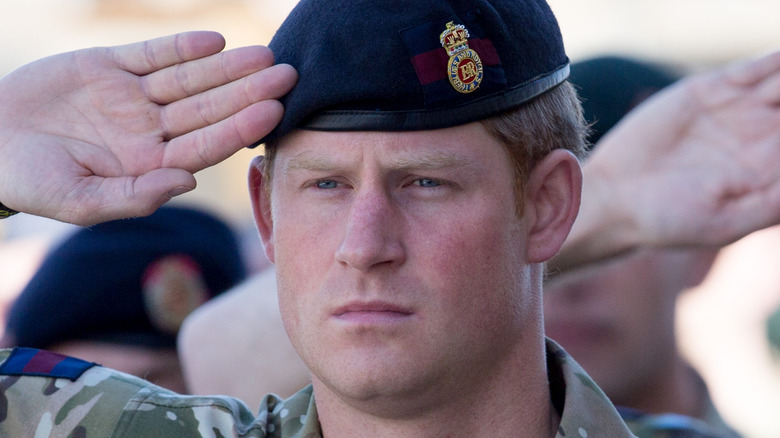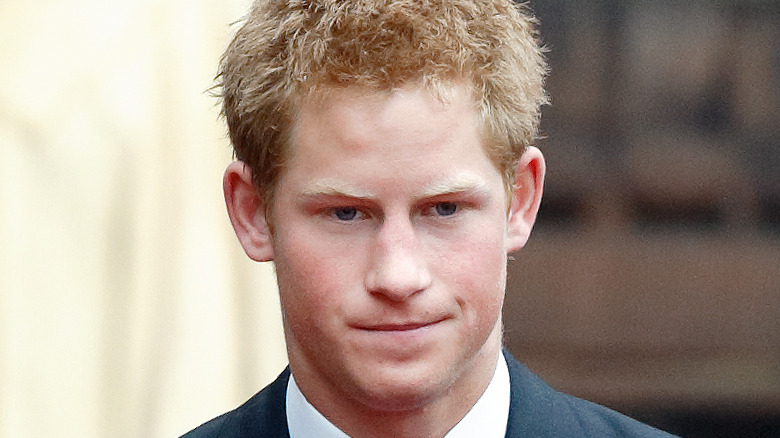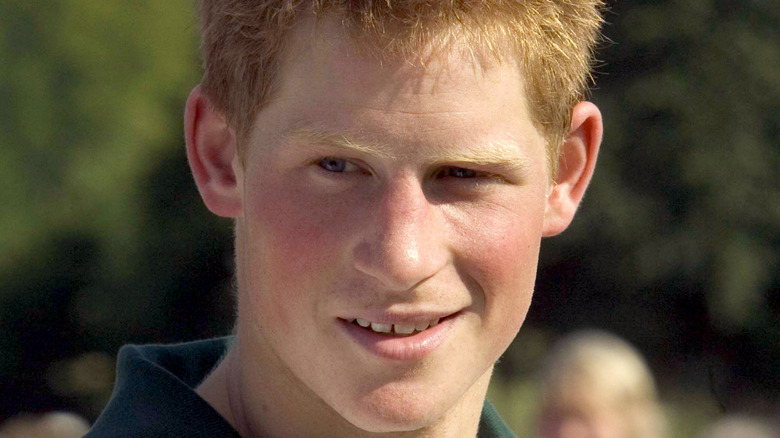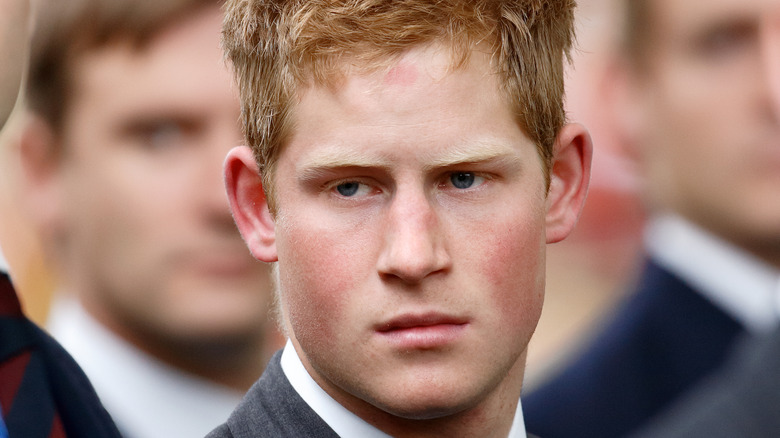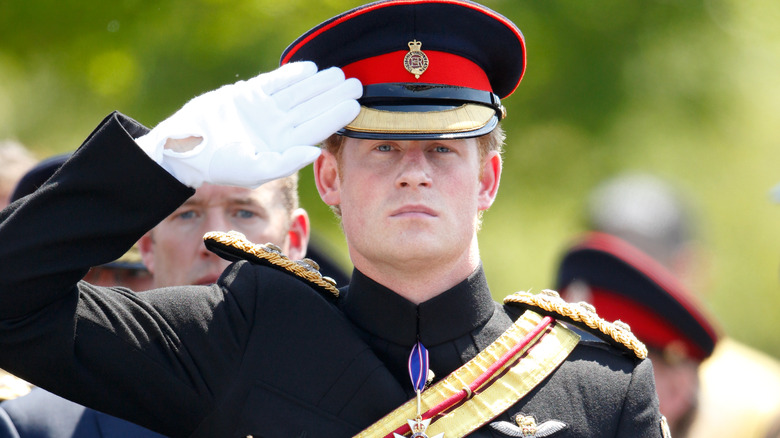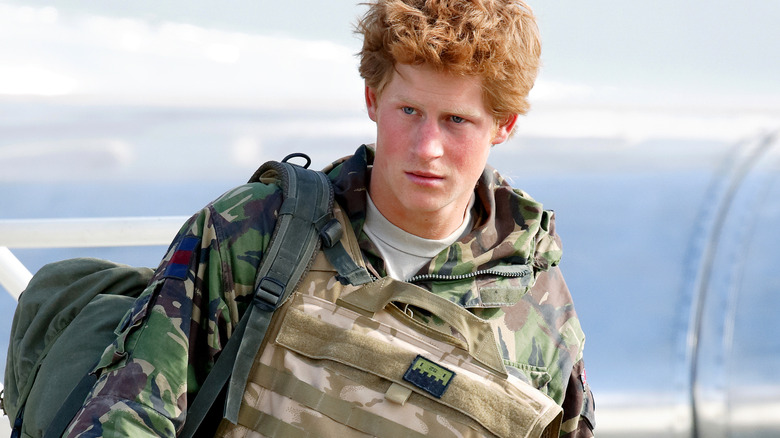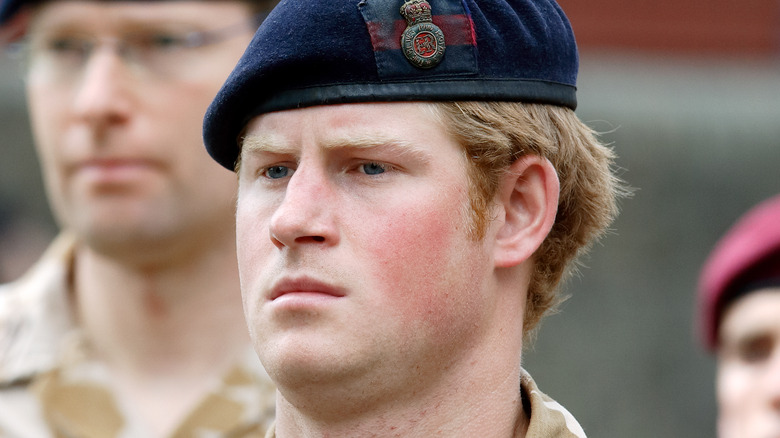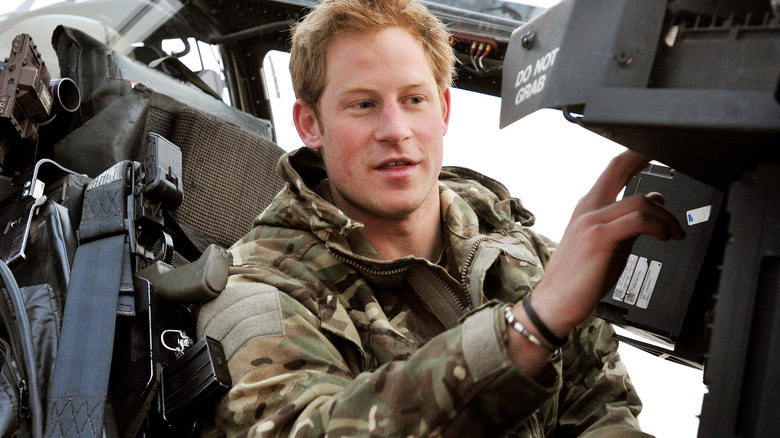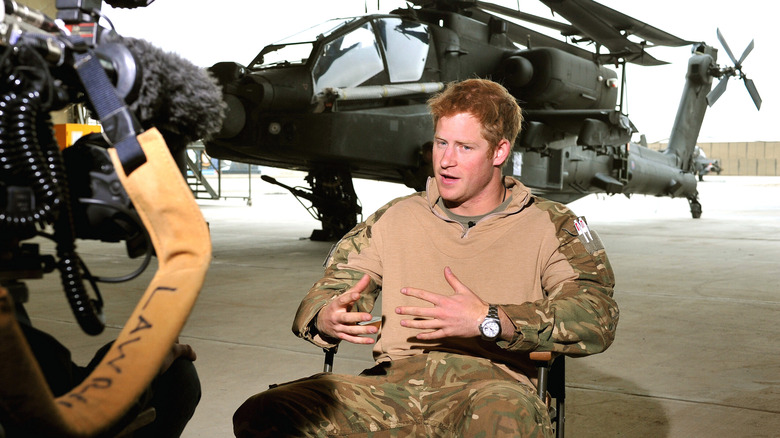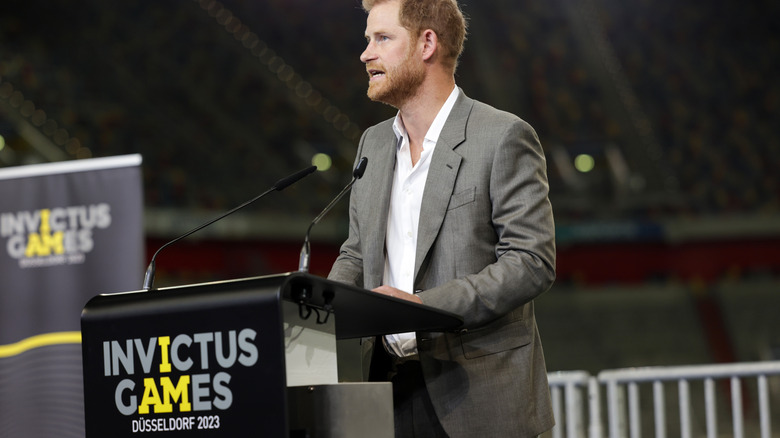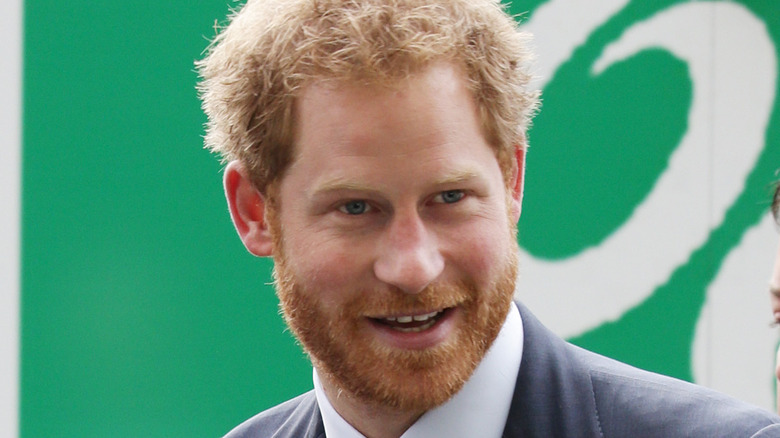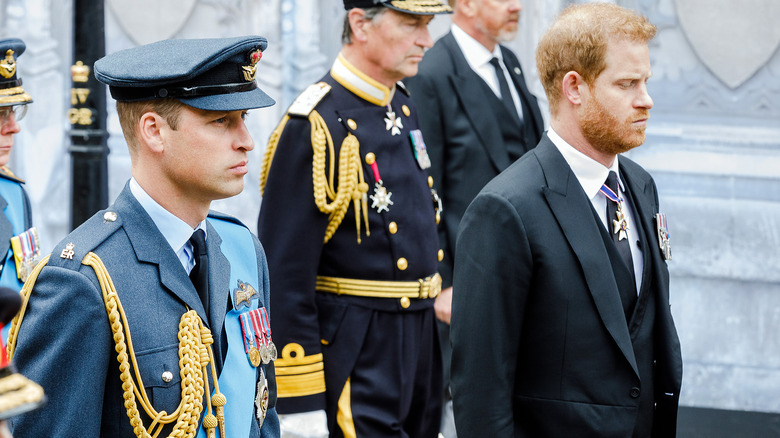A Look Back At Prince Harry's Military Career
Prince Harry proudly served as a member of the British military for 10 years, officially entering service in 2005 when he began training at the royal military school Sandhurst (via The Royal Family). He retired in 2015 following two tours of Afghanistan and years of training and working as an Apache helicopter pilot. Harry eventually earned the position of Captain in the British Army, having chosen this branch of service over the Royal Navy — which other members of his family leaned toward.
Harry's time in the military was dangerous at times, like when his location in Afghanistan was incautiously revealed by an Australian magazine during his first tour (via CBC). Due to this blunder, Harry's time in the country was cut short and he was forced to return to the U.K. after only 10 weeks. Harry also admitted to killing revolutionaries in the country during his second tour: "If there's people trying to do bad stuff to our guys, then we'll take them out of the game ... Take a life to save a life ... Everyone's fired a certain amount" (via The Guardian).
Harry kept his passion for the military and its servicemembers strong after his retirement. He founded the Invictus Games in 2014 for military members with disabilities and those who've been wounded, and the Games continue to this day. Prince Harry achieved a lot during his military career, with many highs and lows in between.
Prince Harry passed his Regular Commissions Board in 2004
Prince Harry's military career kicked off in earnest in 2004 when the royal family announced that he had successfully completed and passed the Regular Commissions Board. The exams are the first step toward enrolling in the royal military academy Sandhurst, where Harry would go on to take classes. The Royal Commission on the Defense of the United Kingdom was founded in 1859 as a way for the nation to assess its ability to defend itself in war.
Harry admitted in a statement from Clarence House that the four-day-long test experience was "very challenging" but that he was "delighted" to have passed (via The Royal Family). He added: "I have set my sights on joining the Army and I am really looking forward to going to Sandhurst next year." The royal took the exam alongside 31 other military hopefuls who, like Harry himself, were being evaluated on their potential to not only serve in the military but to become officers while doing so. Clarence House also shared that Harry's passing of the test wasn't ensured. The test, which covers mental, physical, and emotional abilities, has a pass rate of only 60%.
Prince Harry officially entered the military in 2005
Prince Harry officially entered the military the following year on May 8, 2005. At the time, media outlets insinuated that the prince's close contacts hoped the military would introduce discipline into the life of the then 20-year-old, who had been the subject of a number of negative headlines following his own behavior (via CNN).
Harry's father King Charles accompanied him to his first day at the military academy Sandhurst, where the young royal joined 270 other recruits to receive their uniform and further instructions. Sgt. Maj. Vince Gaunt assured the U.K.'s Press Association (via CNN) that Harry would receive no special treatment due to his royal status, and he was required to stay at the academy for the first five weeks without any outside visits, just like the rest of the recruits.
Harry was also one of the first to join the British Army instead of the Navy. However, several members of the family had their own military experience, including his father, grandfather, and older brother Prince William (via CNN). Harry later revealed that his time in the military caused him to split himself into three parts. According to the prince, his different personas included: "One in the army, one socially in my own private time, and then one with the family and stuff like that. So there is a switch and I flick it when necessary" (via The Guardian).
Prince Harry joined the Blues and Royals in 2006
Prince Harry continued to swiftly enjoy military honors, awards, and promotions early in his time of service. In 2006, a statement (via The Royal Family) announced upon his commission that Harry would become a member of the Blues and Royals regiment within the Household Cavalry with the rank of Second Lieutenant. They also shared that Harry's goals included becoming an Armoured Reconnaissance Troop Leader within the cavalry. The Blues and Royals were first formed in 1969, and the regiment is described as the "second-most senior regiment in the British Army and operates as both an armoured reconnaissance unit and a ceremonial guard of the monarch" (via the National Army Museum).
The next steps for Harry included training as a specialist to become a Troop Leader in the Royal Armoured Corps, which would see Harry as a leader of about 12 soldiers in operations. Additionally, joining the Household Cavalry allowed Harry the opportunity to join the Household Cavalry Mounted Regiment in London, the members of which made up Queen Elizabeth's Life Guard at the time, as well as escorting the sitting monarch to official events. The Royal Family further elaborated on the possibility and noted that, as an officer, Harry would be unlikely to participate as an escort or in the Life Guard.
Queen Elizabeth commissioned Prince Harry as an officer in 2006
One of the more special aspects of Prince Harry's military career is that his grandmother, Queen Elizabeth II, formally commission him into the military in 2006. The occasion took place in April of that year, following Harry's 44 weeks of training and education at Sandhurst. Harry was one of 220 cadets who were commissioned by Queen Elizabeth in the ceremony, and senior members of Harry's family were also in attendance to observe the celebration (via The Royal Family).
Harry took a short break before moving on to specialist training at England's Bovington Camp, where he began working toward becoming an Armoured Reconnaissance Troop Leader. The training took an additional five months and Harry and his fellow recruits learned more about "signals, driving and maintenance" (via The Royal Family).
Queen Elizabeth gave a speech at the event where she told Harry and his comrades that their most important relationships are with the officers they would be in charge of. "If you look at the careers of successful officers, you will find that, no matter how clever they have been, what really matters is how they related to people under their command," the Queen said (via The Spokesman-Review).
Prince Harry was deployed to Afghanistan in 2007
Prince Harry was secretly deployed to Afghanistan in 2007 to serve his first tour of duty. However, the tour was inadvertently cut short after the Australian magazine New Idea heedlessly leaked the news, and Harry was forced to return to the United Kingdom without finishing his assignment in the country. New Idea was compelled to apologize for breaking the global blackout on the story and potentially putting Harry and his fellow soldiers at risk.
The magazine issued a statement that indicated it was not cognizant of the blackout: "We did not knowingly breach any embargo and were not party to any agreement for a media blackout on the story" (via Reuters). Despite insisting that they weren't aware of the blackout, the outlet still recognized the mistake it made and added: "More importantly, we do acknowledge that our actions in publishing the story can be reasonably viewed as insensitive and irresponsible." Following the leaked story, the prince was forced to leave due to concerns for his safety and the safety of his fellow officers, as there were fears that the royal could have become a target for enemy forces.
Prince Harry received a military service medal in 2008
In May 2008, Prince Harry was among military servicemembers who were awarded medals in honor of their service in Afghanistan. Though Harry's first tour of duty was cut short, he was still celebrated for the 10 weeks that he completed. Harry joined 160 other soldiers as they marched through Windsor, where the headquarters for their segment of the military were located. Harry and his fellow military servicemembers each received the Operational Service Medal from Princess Anne, Harry's aunt (via Reuters).
As noted by Reuters, Harry was the first member of the royal family to be involved in active military service in nearly 30 years when he was deployed to Afghanistan. His uncle Prince Andrew previously flew helicopters in the Falklands war in the 1980s.
In March 2017, Harry joined his father to present the same medal he earned in May 2008 to a new group of servicemembers. The royals awarded Operational Medals to the 2nd Battalion Royal Gurkha Rifles at Buckingham Palace (via The Royal Family).
Prince Harry is trained as an Apache pilot
Prince Harry spent several years in the military training and working as an Apache pilot. The American-built helicopters are useful for direct action in war zones, and Harry spent three and a half years working alongside the Apache Force (via CNN). He was so good at this particular role that he earned the title of best co-pilot gunner while still training, and ultimately began working on his own as a pilot in 2012.
According to Harry's commanding officer, the royal was well up to the task of being an Apache pilot. "Captain Wales [Prince Harry] has reached the pinnacle of flying excellence as an Apache pilot, particularly in Afghanistan and, in the process, has proved to be a real inspiration to the many Army Air Corps officers and soldiers who have come to know him so well over the last two years," said Lt. Col. Tom de la Rue (via CNN).
Harry later admitted that he killed members of the Afghan insurgent forces while piloting the helicopters (via The Guardian). As the outlet reported, Harry said that he shot at the Taliban while defending British troops on the ground and also to rescue Afghan civilians and NATO personnel.
Prince Harry returned to Afghanistan in 2012
Four years after his first attempt at serving time on the front lines in the war in Afghanistan, Prince Harry was redeployed to the country as a pilot. This time around, the news was shared publically days after Harry arrived on base in September 2012. Harry joined the 100 troops of the 662 Squadron, 3 Regiment, Army Air Corps, and was welcomed by Royal Navy Captain Jock Gordon, who acknowledged the difficult missions that Harry faced. "He will be in a difficult and demanding job. And I ask that he be left to get on with his duties and allowed to focus on delivering support," Captain Gordon said (via the BBC).
The Ministry of Defence in the U.K. made the deliberate choice to make Harry's location public "on the understanding that newspapers and broadcasters would not give a running commentary on his life out there" (via The Guardian). News organizations and reporters were asked to use discretion to keep Harry and his fellow servicemembers safe.
Harry continued to serve as a pilot for two more years until he stepped down from the role in 2014. Doing so meant that Harry would no longer be allowed to fly helicopters; instead, he would be expected to take on more of a desk-oriented role in London (via CNN). The news outlet also noted that Kensington Palace had revealed that Harry's new responsibilities would include "helping to co-ordinate significant projects and commemorative events involving the Army in London."
Prince Harry founded the Invictus Games in 2014
Even though he retired as an Apache pilot in 2014, Prince Harry demonstrated his intention to remain focused on both the military and the people who serve in it when he founded the Invictus Games in the same year. As noted by the organization's official website, many servicemembers are wounded in combat, and being able to engage in and enjoy sports can help veterans with their mental, emotional, and physical recovery.
Harry founded the Invictus Games after visiting the Warrior Games in the United States in 2013. As the organization's website notes, the term "invictus" means "unconquered." The site explains how the organization "embodies the fighting spirit of wounded, injured and sick Service personnel and personifies what these tenacious men and women can achieve post injury." The first ever Invictus Games took place in London in the summer of 2014; and Harry's charity at the time, The Royal Foundation of The Duke and Duchess of Cambridge and Prince Harry, sponsored the event.
Harry explained his motivation for starting the Games during the first-ever event. He noted: "I have witnessed first-hand how the power of sport can positively impact the lives of wounded, injured and sick Servicemen and women in their journey of recovery" (via The Royal Family).
Prince Harry retired from the military in 2015
Prince Harry's time in the British military officially came to an end in the summer of 2015. Harry announced via Kensington Palace that he would retire from the military following a four-week posting to Australia, which meant that he was in the service for a total of 10 years. Harry was also open about not being sure what professional steps he hoped to take following his retirement (via the BBC).
It was clear that Harry struggled with the decision to retire completely from an experience that was such a dominant part of his life for so long. He shared in part: "I consider myself incredibly lucky to have had the chance to do some very challenging jobs and have met many fantastic people in the process" (via the BBC). Harry added that the experiences he had in the military would "stay with me for the rest of my life" and acknowledged the gratitude he had for the people he met along the way.
Harry's four weeks in Australia consisted of training and domestic duties within the country. He also embarked on a royal tour of New Zealand following the four-week journey through its neighboring nation. After that, his plans included volunteering for conservation work in Africa and helping veterans with disabilities in the United Kingdom.
Prince Harry lost his honorary military titles after stepping back from royal life
Prince Harry and Meghan Markle confidently chose to step back from life as senior members of the royal family in January 2020, a decision that came with a lot of consequences and freedom at the same time. Unfortunately for Harry, one consequence of the act was that he lost his honorary military titles. These included appointments that Harry earned during his time as an active duty member of the military.
For starters, Harry was appointed the Commodore-in-Chief of Small Ships and Diving in 2006 and lost that appointment following his departure from the institution. He was also named an Honorary Air Commandant by the Royal Air Force Honington in 2008 and was named the Captain General of the Royal Marines in 2017. Buckingham Palace acknowledged the end of these patronages in a terse statement that read in part: "As agreed in this new arrangement, they understand that they are required to step back from Royal duties, including official military appointments. They will no longer receive public funds for Royal duties" (via Harper's Bazaar).
Additionally, Harry was forced to have Queen Elizabeth's "ER" initials removed from his Blues and Royals uniform for his grandmother's funeral. An inside source close to the situation told the Sunday Times (via SheFinds) that the act felt like it was done on purpose: "[Harry] is heartbroken. To remove his grandmother's initials feels very intentional."
